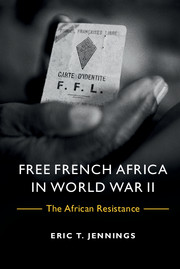Conclusion
Published online by Cambridge University Press: 05 August 2015
Summary
In a speech at the Palais Chaillot, in the shadow of the Eiffel Tower, on January 26, 1945, Henri Laurentie observed that never before had a motherland been liberated by its empire. Far-flung Roman provinces had not retaken Rome after its fall, he noted. Parenthetically, he thereby linked the sacking of the City of Light by the Germans in 1940 to that of the Eternal City by the barbarians in 476. No doubt Laurentie was conveniently forgetting the role of other colonial empires in World War II and even I. Yet this does not change his fundamental point about the actions of Free French Africa, or the risks the region took, and the human cost the area paid to remain in the war when the rest of the French empire had not. The situation was indeed unusual: the British Crown had not fled to Canada – a contingency plan that was never pressed into service – nor had the French government relocated to North Africa in June 1940 (although some certainly attempted this undertaking, only to be labeled traitors for doing so).
In this sense, Laurentie was correct to underscore the importance of FEA and Cameroon as seats of Free France. He was also right to insist on the singularity of this liberating army that departed from the equator to fight first in the Sahara, then Europe. This arrow running from south to north constitutes one of the defining features of the Free French war effort. As troops were madly being recruited in FEA and Cameroon, Free France was registering its first victories against the Italians in the heart of the Sahara. These triumphs would be followed by others in the northern reaches of the desert, at Ksar Rhilane for instance. Some of these same troops would then contribute to the liberations of Italy and France.
Lucidly, Laurentie went further still, when he maintained that the Free French effort in Africa rested largely on the shoulders of the colonized. He declared, “In their own way, black Africans were pure Gaullists.”
- Type
- Chapter
- Information
- Free French Africa in World War IIThe African Resistance, pp. 273 - 276Publisher: Cambridge University PressPrint publication year: 2015

